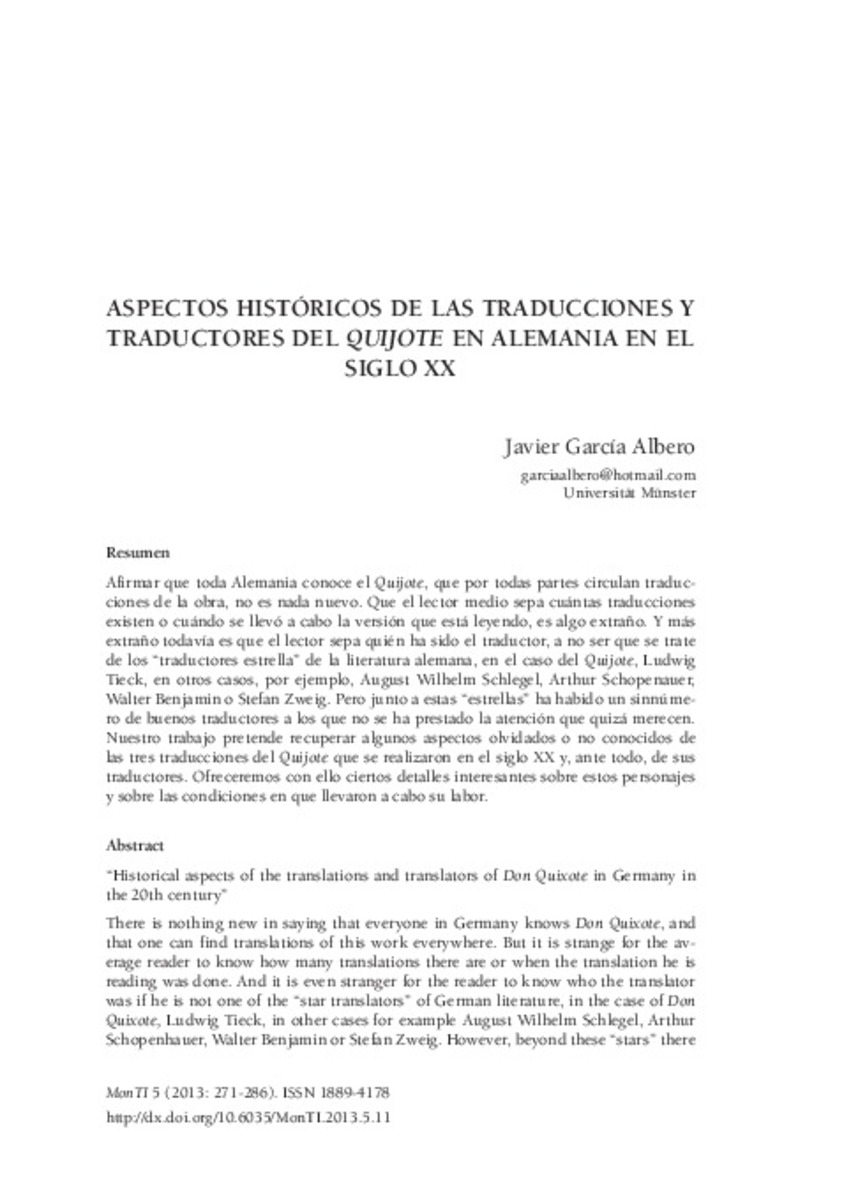Mostrar el registro sencillo del ítem
Aspectos históricos de las traducciones y traductores del Quijote en Alemania en el siglo XX
| dc.contributor.author | García Albero, Javier | |
| dc.date.accessioned | 2014-11-06T12:16:44Z | |
| dc.date.available | 2014-11-06T12:16:44Z | |
| dc.date.issued | 2013 | |
| dc.identifier.citation | GARCÍA ALBERO, Javier. Aspectos históricos de las traducciones y traductores del Quijote en Alemania en el siglo XX. MonTI. Monografías de Traducción e Interpretación, 2013, no 5, p. 271-286. | ca_CA |
| dc.identifier.issn | 1889-4178 | |
| dc.identifier.issn | 1989-9335 (electrònic) | |
| dc.identifier.uri | http://hdl.handle.net/10234/107541 | |
| dc.description.abstract | Afirmar que toda Alemania conoce el Quijote, que por todas partes circulan traducciones de la obra, no es nada nuevo. Que el lector medio sepa cuántas traducciones existen o cuándo se llevó a cabo la versión que está leyendo, es algo extraño. Y más extraño todavía es que el lector sepa quién ha sido el traductor, a no ser que se trate de los “traductores estrella” de la literatura alemana, en el caso del Quijote, Ludwig Tieck, en otros casos, por ejemplo, August Wilhelm Schlegel, Arthur Schopenauer, Walter Benjamin o Stefan Zweig. Pero junto a estas “estrellas” ha habido un sinnúmero de buenos traductores a los que no se ha prestado la atención que quizá merecen. Nuestro trabajo pretende recuperar algunos aspectos olvidados o no conocidos de las tres traducciones del Quijote que se realizaron en el siglo XX y, ante todo, de sus traductores. Ofreceremos con ello ciertos detalles interesantes sobre estos personajes y sobre las condiciones en que llevaron a cabo su labor. | ca_CA |
| dc.description.abstract | There is nothing new in saying that everyone in Germany knows Don Quixote, and that one can find translations of this work everywhere. But it is strange for the average reader to know how many translations there are or when the translation he is reading was done. And it is even stranger for the reader to know who the translator was if he is not one of the “star translators” of German literature, in the case of Don Quixote, Ludwig Tieck, in other cases for example August Wilhelm Schlegel, Arthur Schopenhauer, Walter Benjamin or Stefan Zweig. However, beyond these “stars” there has been a large amount of good translators that have not been paid the attention they might deserve. This article tries to recover some forgotten or unknown details of the three German translations of the Quixote in the 20th century and, above all, of its translators. Some interesting details will be presented about these personalities and about the conditions under which they carried out their job. | ca_CA |
| dc.format.extent | 16 p. | ca_CA |
| dc.format.mimetype | application/pdf | ca_CA |
| dc.language.iso | spa | ca_CA |
| dc.publisher | Universitat Jaume I | ca_CA |
| dc.publisher | Universitat de València | ca_CA |
| dc.publisher | Universitat d' Alacant | ca_CA |
| dc.relation.isPartOf | MonTI, 2013, núm. 5 | ca_CA |
| dc.rights.uri | http://creativecommons.org/licenses/by/4.0/ | * |
| dc.subject | Historia | ca_CA |
| dc.subject | Traducción | ca_CA |
| dc.subject | Alemania | ca_CA |
| dc.subject | Quijote | ca_CA |
| dc.subject | Siglo XX | ca_CA |
| dc.subject | History | ca_CA |
| dc.subject | Translation | ca_CA |
| dc.subject | Germany | ca_CA |
| dc.subject | Quixote | ca_CA |
| dc.subject | 20th century | ca_CA |
| dc.title | Aspectos históricos de las traducciones y traductores del Quijote en Alemania en el siglo XX | ca_CA |
| dc.title.alternative | Historical aspects of the translations and translators of Don Quixote in Germany in the 20th century | ca_CA |
| dc.type | info:eu-repo/semantics/article | ca_CA |
| dc.identifier.doi | http://dx.doi.org/10.6035/MonTI.2013.5.11 | |
| dc.rights.accessRights | info:eu-repo/semantics/openAccess | ca_CA |
Ficheros en el ítem
Este ítem aparece en la(s) siguiente(s) colección(ones)
-
MonTi_ 2013 _núm 5 [17]









